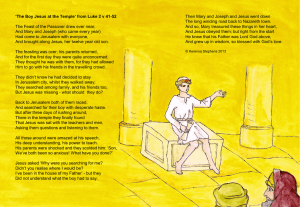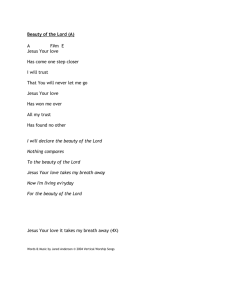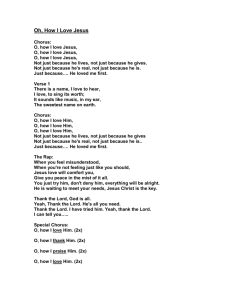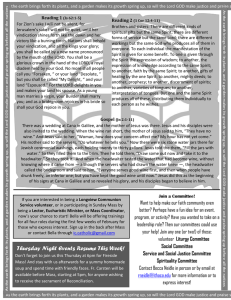Homily for January 18, 2009, 2 Sunday (B), St Ignatius Church.
advertisement
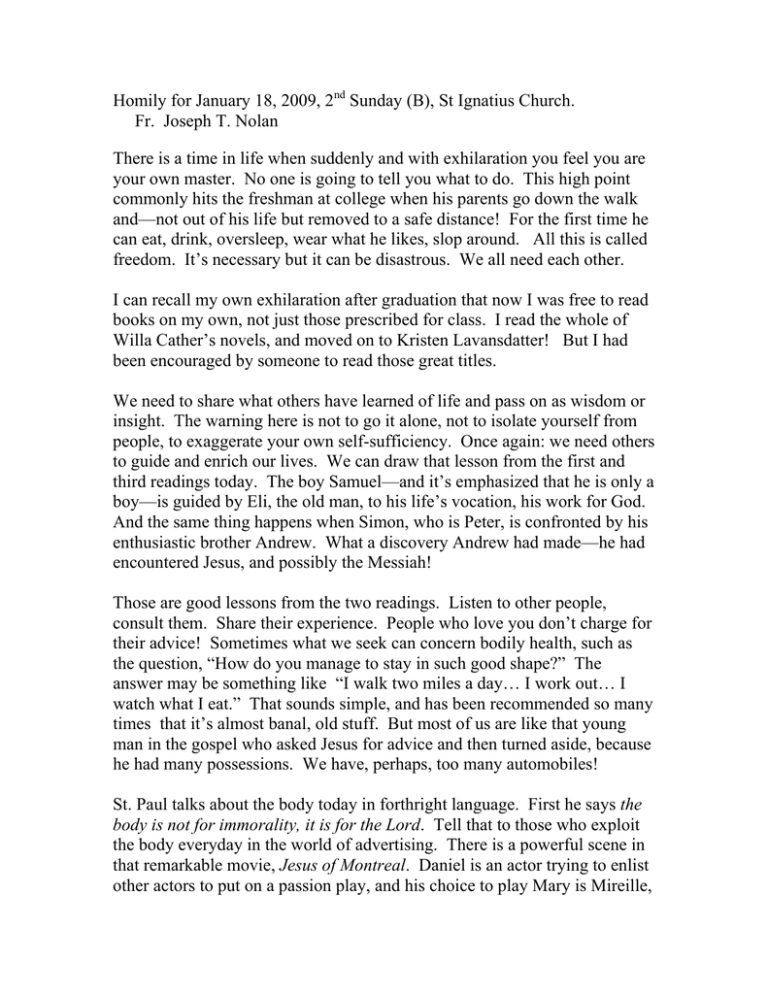
Homily for January 18, 2009, 2nd Sunday (B), St Ignatius Church. Fr. Joseph T. Nolan There is a time in life when suddenly and with exhilaration you feel you are your own master. No one is going to tell you what to do. This high point commonly hits the freshman at college when his parents go down the walk and—not out of his life but removed to a safe distance! For the first time he can eat, drink, oversleep, wear what he likes, slop around. All this is called freedom. It’s necessary but it can be disastrous. We all need each other. I can recall my own exhilaration after graduation that now I was free to read books on my own, not just those prescribed for class. I read the whole of Willa Cather’s novels, and moved on to Kristen Lavansdatter! But I had been encouraged by someone to read those great titles. We need to share what others have learned of life and pass on as wisdom or insight. The warning here is not to go it alone, not to isolate yourself from people, to exaggerate your own self-sufficiency. Once again: we need others to guide and enrich our lives. We can draw that lesson from the first and third readings today. The boy Samuel—and it’s emphasized that he is only a boy—is guided by Eli, the old man, to his life’s vocation, his work for God. And the same thing happens when Simon, who is Peter, is confronted by his enthusiastic brother Andrew. What a discovery Andrew had made—he had encountered Jesus, and possibly the Messiah! Those are good lessons from the two readings. Listen to other people, consult them. Share their experience. People who love you don’t charge for their advice! Sometimes what we seek can concern bodily health, such as the question, “How do you manage to stay in such good shape?” The answer may be something like “I walk two miles a day… I work out… I watch what I eat.” That sounds simple, and has been recommended so many times that it’s almost banal, old stuff. But most of us are like that young man in the gospel who asked Jesus for advice and then turned aside, because he had many possessions. We have, perhaps, too many automobiles! St. Paul talks about the body today in forthright language. First he says the body is not for immorality, it is for the Lord. Tell that to those who exploit the body everyday in the world of advertising. There is a powerful scene in that remarkable movie, Jesus of Montreal. Daniel is an actor trying to enlist other actors to put on a passion play, and his choice to play Mary is Mireille, a young woman very unsure of herself, short of money, and committed—so she thinks—to one more TV commercial. The script is to sell beer, and they do it by selling bodies—or a woman’s allure. She does not listen to Daniel urging her to forego all this, so he accompanies her to the studio. She forgot to bring a bikini, and the sneering producer orders her to remove her outer clothing. Suddenly Daniel in a rage shouts, “Don’t do it!” and then smashes the TV cameras, overturns the tables, and picking up a heavy coil, quite literally lashes the whole film crowd out of the studio. We recognize the parallel, it is a replay of the scene in the gospel in which Jesus chases the money changers from the temple. Jesus too was in a rage and shouting angrily, “You have defiled this place!” Daniel is also concerned with the temple, in this case the human body. He believes what St. Paul says so clearly today, that “the body is a temple of the Holy Spirit who is within.” And that’s why the apostle says unequivocally: “Shun lewd conduct.” Think of our culture. If you add song to sight, our senses are assaulted with the scenes and language of lewd conduct all the time. The lyrics of some song writers have no place among people who have any taste or sense of propriety. It is not a matter of prudery but of privacy that leads us to protest what passes for entertainment in the advertising world and with certain types of music. It is also important to understand what he means by “the Lord is for the body.” His church often has not been for the body and labeled it shameful, especially a woman’s body. Through the centuries artists and sculptors have portrayed women, especially Eve, as the temptress. And theologians in the past commented on sexual union, even in marriage, as sinful or close to it. The present pope has startled and embarrassed some people by his discourses on the theology of the body; he understands, as we should have known all along, that we are bodily creatures, made that way by God. And the expression of love that unites a man and woman is both designed and blessed by God. All our life is exercised through the body as instrument, and while we exult in our intellectual powers, there is no mind without a brain and without a body. We are a unity, one person, flesh and blood included. The challenge here is to transform bodily life into fully human life, serving human ends. Nothing makes this more obvious than to reflect on how sex is transformed by love. It is not bodies we love, it is persons. In living we do not leave our bodies behind, as some spiritual exercises have tried to make us do. There is one time we leave them behind—yes, when we die. Benjamin Franklin in old age compared his body to a book that is tattered and worn, almost useless, and ready for a new edition! The apostle puts it more simply and powerfully in the language of faith. He says, “The Lord is for the body. And God who raised up Jesus the Lord will raise us also by his power.” As persons of faith we await, even with a certain peace, that moment when we are embodied through the Creator’s power and love in a new creation. And now, let us reflect on the great event that will happen on Tuesday. What can we say – and pray – about the inaugural of our new president, Barack Obama, a message that can come from all of us with jubilation, regardless of whom we voted for? The answer is easy—and wonderful: what is happening is a tremendous rollback of our national sin of racial prejudice. How many tears, how much pain, how many lives have been lost to bring about this moment when we affirm what is best in America! Here is a true story of that prejudice that staggers one. A Catholic boy growing up in a small town in Alabama accepted the fact that there was a Catholic church for whites and a smaller Catholic church for blacks. When a leader in the black community died, the pastor agreed to let them have the large funeral in the white Catholic church. What happened? Some of the parishioners gathered outside and -- stoned the coffin as it was carried out. The boy decided he wanted to become a priest like his heroic pastor. Eventually he became an auxiliary bishop in Brooklyn. The other story is also in the l940s -- my conversation with a priest on a train to Fort Smith, Arkansas. I was not a priest; I was an agent of the federal government on my way to my first assignment. He talked of the different Catholic churches in town – Irish, German, black -- and concluded: “We don’t have any trouble here with the Nigras” (his word) “as long as they keep their place.” I wonder what he would think today when the American people have decided that the right place for one of them is the Executive Mansion. The White House. God bless the day, all of us, the new president and the nation.






